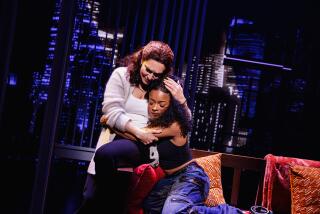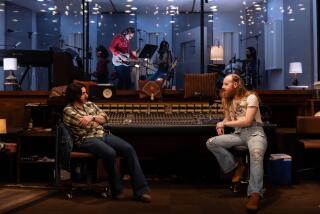Without Talks, the Strikers Play Broadway
- Share via
NEW YORK — The plot of the biggest production on Broadway Saturday had anger, accusations of greed, a chorus, a funeral march, pickets, disappointed theatergoers and worried business owners.
At the root of it all was a bitter controversy over the use of digital music technology in theaters.
The stage of virtually every Broadway musical was dark, and no negotiations between striking theater musicians and the League of American Theaters and Producers were scheduled.
To mark the temporary demise of the 18 shows, some of the musicians -- who are supported by actors and stagehands -- carried signs in the shape of tombstones. Fears were expressed that positions could harden at a time of year when tourism generally picks up and producers in the past have enjoyed profitable seasons.
“We were willing to work through the weekend, to lock ourselves in a room to get a final deal,” said Shawn Sachs, a spokesman for Local 802 of the American Federation of Musicians. Sachs said the producers walked out of the talks Friday after presenting an offer to limit the size of theater orchestras to 15 people, which was unacceptable to the union.
Sachs likened the offer to “playing baseball without an outfield.” Under the expired contract, minimums in large theaters ranged from 24 to 26 players.
Some producers had planned to the keep the curtain up by using recorded music in case of a strike. But support from Actors’ Equity Assn. and the Broadway local of the International Alliance of Theatrical Stage Employees forced the cancellation of performances.
Saturday afternoon, to demonstrate solidarity, hundreds of musicians staged a funeral march through the Times Square area, complete with a replica coffin emblazoned with the slogan “Don’t Let Producers Kill Broadway.”
The musicians played a dirge with a hip Broadway beat. Visitors aboard a tour bus climbed out and clapped, some spectators danced -- and police officers assigned to the demonstration smiled and tried hard to avoid keeping time to the music.
To underscore their determination, the procession stopped near the building housing the law firm where the negotiations were held. At a rally outside the office building, the musicians received support from the United Federation of Teachers and the New York City Central Labor Council.
Earlier, picketers marched in front of all 18 theaters.
Outside the Imperial Theater, the cast and chorus of “Les Miserables” sang the show’s rousing finale in perfect harmony, and pedestrians applauded.
“When it comes down to a strike, I am a union man,” said Nick Wyman, 52, who plays the comic role of Thenardiar in the production. “I think it’s a very important issue, the idea of live music, live performances on Broadway.”
Picketing with musicians outside the Marquis Theater on Broadway, where “Thoroughly Modern Millie” is on the playbill, actor Richard Alan Rice carried a hand-lettered sign: “What’s next, virtual actors?”
“What it boils down to, it seems the producers are trying to phase out live music on Broadway,” Rice said. “They want to have synthetic music, and that’s not what Broadway is about. You come for live actors; you come for live music. That’s what Broadway is about.”
Nearby, Anik Oulianine, who is in the “Millie” orchestra, held up a poster.
“I love my cello. Read my strings. No canned music,” it proclaimed. “We are trying to defend a culture. We are trying to save jobs,” she said.
“I have been a musician all my life,” added Leo Huppert, who plays the bass in the same orchestra. “I did not come to New York to be replaced by a CD player.”
A major issue in the strike is the desire of producers to install virtual orchestras in the theaters. The computer-based devices can supplement and in some cases substitute for live musicians.
All along the Great White Way, disappointed ticket holders demanded and received refunds at box offices.
Lisa Giambattista, a teacher’s aide, turned in tickets at the St. James Theater, where “The Producers” was canceled.
“I have to agree with the actors going on strike with the musicians,” she said, sounding disappointed. “They are right basically. We continue to pay good money for these tickets. We don’t want to listen to recorded music.”
Giambattista said she was going to go to a comedy club.
Broadway supports a host of businesses, and their owners were worried Saturday as customers stayed away.
“I had four people coming from Texas. I had two cars. They canceled,” said Thomas Murray, a limousine driver who stopped in traffic for a moment.
Across the street at Sam’s Restaurant, William DeManiow, one of the managers, lamented the walkout, which he described as an “added blow” after the attack on the World Trade Center.
“We get a lot of business from theater people, people in shows, people who go to shows,” he said. “We have had a fourth of our reservations for tonight canceled already, plus I am sure half of the other people won’t show up anyway.”
Mohamad Samad stood behind the counter of his empty souvenir and electronics store in the theater district looking at shelves of statues of the Empire State Building and bells and picture frames with slogans praising New York.
“Before, it was busy,” he said. “Now, it’s not so busy.”
More to Read
The biggest entertainment stories
Get our big stories about Hollywood, film, television, music, arts, culture and more right in your inbox as soon as they publish.
You may occasionally receive promotional content from the Los Angeles Times.










